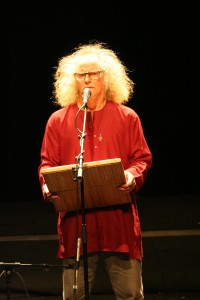The second part of the Africolor music concert held in Bobigny on December 5 featured Danyèl Waro, a singer from La Réunion.
Accompanied by a number of percussionists, Waro sang maloya—a musical genre descended from the era when slaves worked the plantations of the island. For Waro, this music represents many things, including defiance. In 1946, Reunion Island was incorporated into the French administration as an overseas département. By the early 60s, the music was perceived as a symbol of revolt against the established order and was (unofficially) banned.
Waro was born in 1955 to a family that lived in a hut with no running water or electricity. In 1972, he embraced maloya as well as the militancy associated with it after attending a concert by maloya singer Firmin Viry. When inducted into the French army in 1976, Waro refused to wear the uniform and was sent to jail for two years for insubordination. During that time he wrote songs evoking themes of resistance and solidarity, including his passion for his native land, the hardships of working as a sugar cane cutter, and the anti-apartheid struggle in South Africa.
Today, Waro is recognized as one of the foremost singers of maloya. He refuses to compromise the music, performing it only in Créole with acoustic (as opposed to electronic) instruments, including those he makes himself—the kayamba, the bobre, and the rouleur. Womex, an organization that promotes folk, ethnic, and traditional music, called him “the uncompromising maloya hero from Reunion Island.” On October 31, 2010 he received the Womex Artist Award. On November 24, he received the Prix de l’Académie Charles Cros for his album Aou Amwin.
To the unaccustomed ear, the music sounds strange and exotic. Waro’s voice is powerful, and though I could not understand the words, I could sense the emotional intensity. In one of his songs (I do not know if he performed it that day), Waro urges his compatriots to be proud of what he calls their island’s “bastard” society made up of Africans, Madagascans, Indians, Chinese, and Europeans.
Bastardicité
I’m not white
no, I’m not black
don’t pin me with an ethnicity
I’m cross-breed cafres (black), yab (white), malbar (Indian)
my roots are bastard, fine and pure
sinwa (Chinese), arab (Arab), zorèy (French), komor (Comorian)
my roots are bastard, fine and pure
Go on, find it if you want
Go on, buy it if you want
your white-icity, your French-icity,
me, I got no need to search
I got a reservoir of qualities
that flows and overflows
from all my Bastardicity
all my Reunionicity
Go on, find it if you want
Go on, buy it if you want
your pure Indian-icity, your pure Chinese-icity
your pure European-icity, your pure African-icity
me, I got no need to search
I got a reservoir of qualities
that flows and overflows
from all my Bastardicity
all my Reunionicity
Go on, straighten your hair
Go defrizz it if you care
I got no need to flatten my curl
I like my afro fluffed out full
it makes a great pillow for me and my girl
Play your snob games if you care
Show off your French, your savoir-faire
I got no need to brag that way
I got my Creole growl in me
to sing my maloya, my séga kabaré
to sing my maloya, my narlgon kabaré.
(Song by Danyèl Waro from his album Batarsité on the Piros label, 1994)
An interview (in French) of Waro that appeared in Culture en Movement magazine in February 2000 has been posted to the Web site L’Elixir du Dr. Funkathus.
An extensive article (in English) about him can be found on the Womex Web site.


